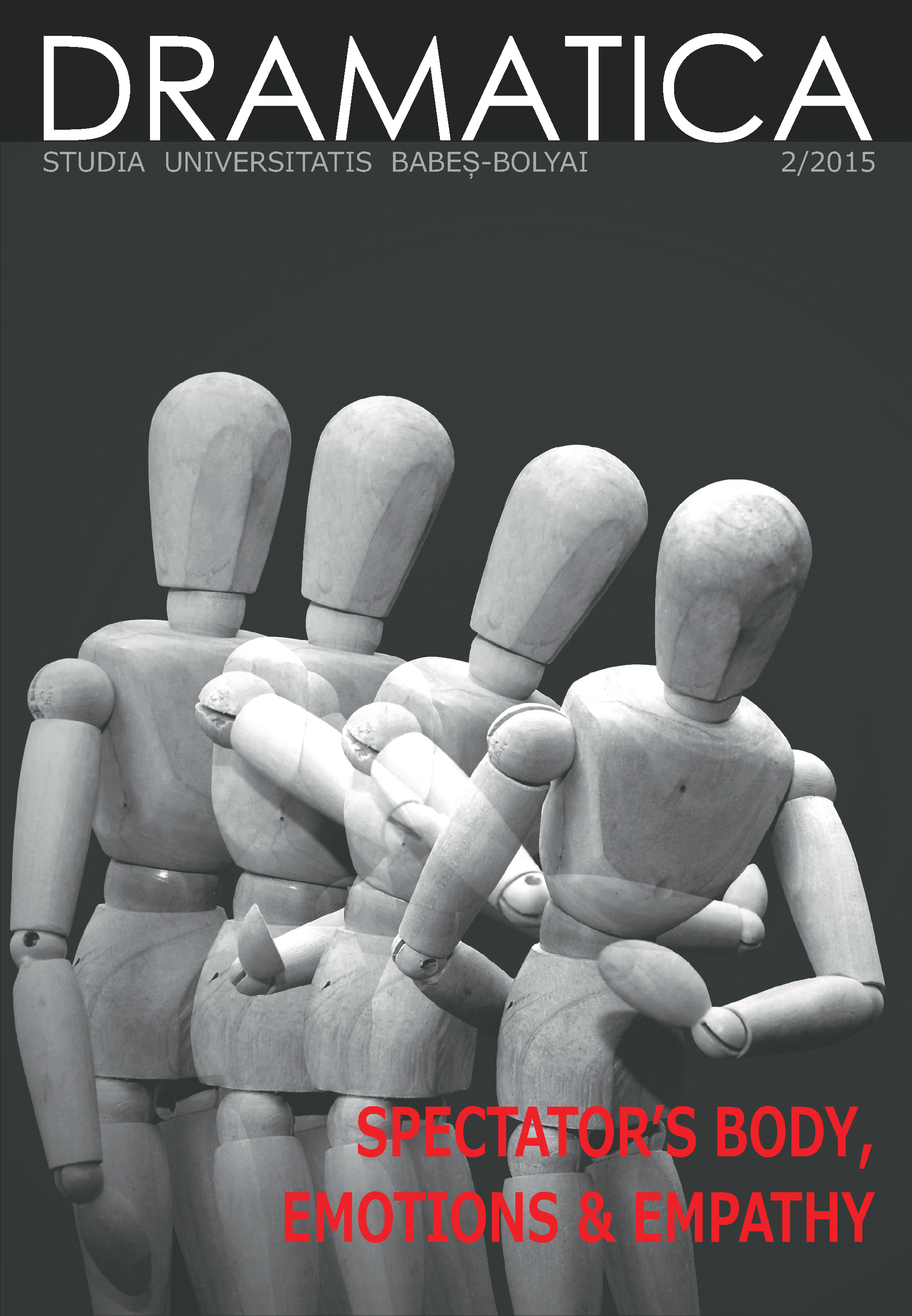The battle for the neuron’s wings
Keywords:
neuroscience; mirror neurons; catharsis; neuroarthistory; sentimental catharsis; reasoning, reflexive catharsis.Abstract
The following study uses as its starting point the ancient battle between philosophy and theatre and takes as a road companions it’s two most famous protagonists: Plato and Aristotle. Taking a close look at their writings, I found not only an answer considering their battle for knowledge, for the encirclement of the spectator’s mind, but also the traces of one ‘predecessor’ of neuroscience – Aristotle. Informed by John Onians’s theories regarding neuroscience, art and history, and also adding neural plasticity as an ingredient, I’ve built my own personal (sup)position regarding catharsis, which I see as a two-fold experience/process - an emotional catharsis and a reasoning, reflexive catharsis.References
ARISTOTLE. De Anima. Translated, with Introduction and Notes Mark Shiffman. Newburyport: Focus Publishing R. Pullins Co., 2011.
ARISTOTLE. Poetics. The Internet Classics Archives. MIT. Web. July 26 2015.
BĂLAN, Raluca, Adaptations of tragic in contemporary dramaturgy (doctoral thesis, defended at University of Arts, 22nd of June 2012).
CASTELLUCCI, Claudia, Romeo Castellucci, Chiara Guidi, Joe Kelleher, Nicholas Ridout. The Theatrae of Socìetas Raffaello Sanzio. London&New York: Routledge, 2007.
CELA-CONDE, Camilo J. et al. Activation of the prefrontal cortex in the human visual aesthetic perception. NCBI. NCBI, Web. July 26 2015.
DI BENEDETTO, Stephen. The Provocation of Senses in Contemporary Theatre. London and New York: Routledge, 2010.
ECO, Umberto. The Name of the Rose. Translated from the Italian by William Weaver, New York: Warner Books, 1984.
GAZZANINGA, Michael S.. Human. The Science Behind What Makes Us Unique. New York: Harper Collins, 2008.
GOMPERTZ, Will. What Are You Looking At. New York: Penguin, 2012.
HALL, Edith. The Theatrical Cast of Athens. Interactions between Ancient Greek Drama and Society. Oxford: Oxford University Press, 2006.
JACOBSON, Stanley, Elliott M. Marcus. Neuroanatomy for the Neuroscientis. New York: Springer Science, 2008.
KAWABATA, Hideaki and Semir Zeki. ”Neural Correlates of Beauty.” Journal of Neurophysiology 91 (2004): 1699-1705.
LAËRTIUS, Diogenes. The Lives and opinions of Eminent Philosophers. Literally translated by C.D. Yonger, M.A. London: George Bell and Sons, 1901.
MCCONACHIE, Bruce. Engaging Audiences. A cognitive Approach of Spectating in the Theatre. London: Palgrave Macmillan, 2008.
ONIANS, John, Eric Fernie. ”Neuro ways of seeing. Neuroarthistory”. Tate Etc, issue 13, 1 May 2008. Web. July 26 2015.
NUSSBAUM, Martha, The Fragility of Goodness: Luck and Ethics in Greek Tragedy and Philosophy, Cambridge: Cambridge University Press, 2001.
PAVIS, Patrice. Dictionary of the Theatre – Terms, Concepts and Analysis. Toronto: University of Toronto Press Incorporated, 1998.
PLATO, Alcibiades I. Project Gutenberg. Web. May 25 2015.
PLATO, Meno and Phaedo. Cambridge: Cambridge University Press, 2011.
PLATO, The Symposium and The Phaedo. Wheeling, Illinois: Harlan Davidson, 1980.
RICHARDS, Mary. Marina Abramović. London and New York: Routledge, 2010.
RIZZOLATTI, Giacomo, Corrado Sinigaglia. Mirrors in the Brain – How Our Minds Share Actions and Emotions. Oxford: Oxford University Press, 2008.
ROSE, Martha L. The Staff of Oedipus. Transforming disability in Ancient Greece. Michigan: The University of Michigan Press, 2003.
ROSENBAUM, David A. Human Motor Control, Waltham: Academic Press, 2010.
SOPHOCLES. Antigone, Oedipus the King & Electra. Oxford: Oxford University Press, 1994.
Fox, Jonathan M.D. (editor). The Essential Moreno: Writings on Psychodrama, Group Method, and Spontaneity by J.L, Moreno,M.D. New York: Springer Publishing Company, 1987.
Wilson, Robert A and Frank C. Keil (editors). The MIT Encyclopedia of the Cognitive Sciences. Cambridge, Massachusetts, London: The MIT Press, 1999.
The Republic of Plato.Second edition, translated with notes and an interpretive essay by Allan Bloom. New York: Basic Books, 1991.
UBERSFELD, Anne. Reading theatre.Toronto: University of Toronto Press, 1999.
Downloads
Published
How to Cite
Issue
Section
License
Copyright (c) 2015 Studia Universitatis Babeș-Bolyai Dramatica

This work is licensed under a Creative Commons Attribution-NonCommercial-NoDerivatives 4.0 International License.


